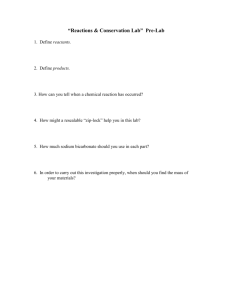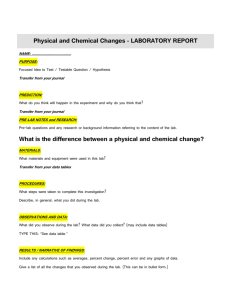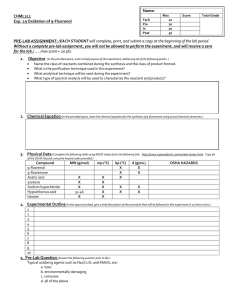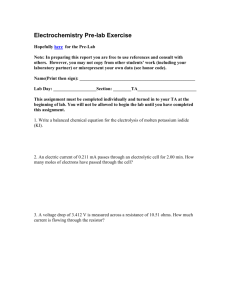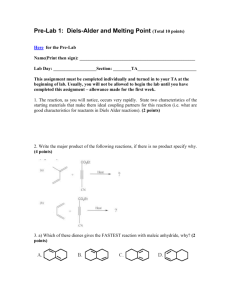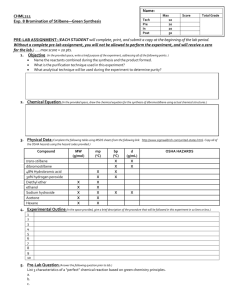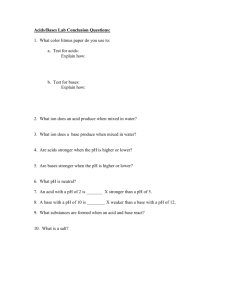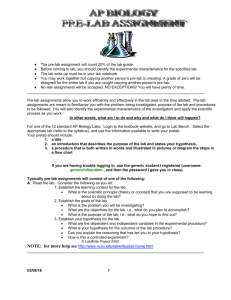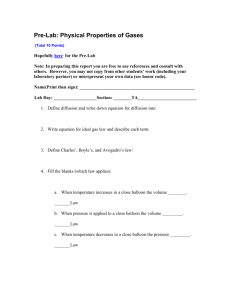Pre-lab questions and answers - Chemistry Classes of Professor Alba
advertisement
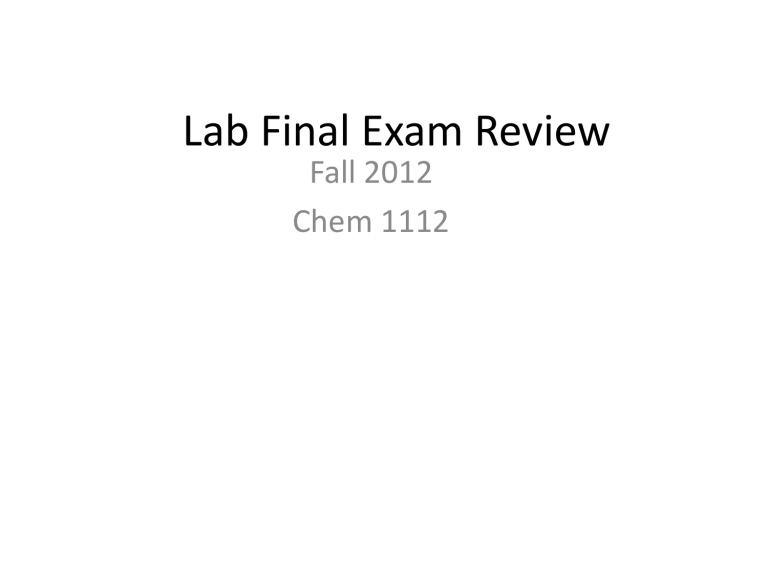
Lab Final Exam Review Fall 2012 Chem 1112 Question Types on the Final Exam Multiple Choice Short answer True/False Matching Solving Problems/Interpreting graphs or diagrams Overview • Glassware, Names and uses: http://albachemistry.weebly.com/uploads/8/8/0/4/88 04622/glassware.pdf • Instruments and use: See individual labs • Techniques: See individual labs • ALL Pre-lab questions and answers : Publishers answer key will be posted on ACES- do not copyyou can improve on their answers • Selected Results and Calculations : see this Powerpoint • Parts of FORMAL LAB Report and what goes into each part: http://albachemistry.weebly.com/formallab.html Selected Results and Calculations: What to study for each lab is detailed on the following slides but make sure you study the Powerpoints for each lab posted in the Lab Files and on our weebly website. 9B Oil of Wintergreen to Salicylic Acid • All (pre and post lab questions and results) • Names and structure of reactant and product: common and technical (IUPAC) • The Chemical Reaction and conditions • Calculating limiting reactant • Calculating Theoretical Yield & Percent or % Yield • Techniques and important precautions: • A. Suction filtration/ vacuum filtration • B. Precipitation Recrystallization • C. Melting point Determination 10A Geometric Isomers • Pre-lab only • What is an isomerization? How can you tell isomers apart? • Know structures and names 12A Molar Mass from Freezing Point • All (pre- and post lab, results, graphs and calculations) • Know all related definitions very well (see lab ppt) • Given a freezing point set-up, be able to analyze errors or poor conditions (see ppt) • Given a graph, know how to extrapolate, know how to determine the change in freezing point from the graph 13 Rate of an Iodine Clock Reaction • Pre-lab only • Be able to explain how this experiment uses the rate law expression 14A Le Chatelier’s Principle • Pre-lab only • Be able to use Le Chatelier’s Principle to predict experimental results for a given chemical reaction 14B Determining an Equilibrium Constant • All (prelab, postlab, results graphs, calculationsincluding parts of a formal lab report as discussed in class • Be able to write the chemical formulas and the equilibrium reaction • What is the theory behind spectrophotomertry? Possible sources of error? • What is a standard calibration curve? • How is a Spectronic 20 Spectrophotometer used? 15 Relative Strengths of Acids and Bases • Pre-lab only • Be able to describe how to carry out each type of analysis using:1. indicator solutions 2. pH paper 3. pH meter • Which of the methods is most precise and why? • What is the proper technique in using pH paper? • How is a pH meter calibrated? What does a pH meter measure? 15 Relative Strengths of Acids and Bases (continued) • Given a diagram (or key) Indicator Color Chart and a set of results, be able to figure out the possible pH of a solution by narrowing down the range (see lab ppt) 16A Equilibria with Weak Acids • Pre-lab only • What is the effect on pH of: – dilutions – mixing acids and bases – mixing acids – mixing acids or bases with the salt of the acid or base • CH3COONa = sodium acetate, the sodium salt of acetic acid • NH4NO3 = ammonium nitrate, the ammonium salt of nitric acid, or the nitrate salt of ammonia • Na3PO4 = sodium phosphate, the sodium salt of phosphoric acid 16B A Titration Curve • All (pre and postlab questions and answers, Results and calculations and graphs) • Define all terms • Given a titration curve be able to explain, its parts and what is happening in the solution at stages before, during and after the equivalence point • Identify the type of acid-base titration: strongstrong or weak-strong from a diagram 18 Spontaneity • Pre-lab only • Study all definitions and how to use the table for determining spontaneity ( see lab ppt) • Be able to explain which of the parameters were measured in this lab and which ones were calculated in the Gibbs free Energy Formula( DG =DH – TDS)
